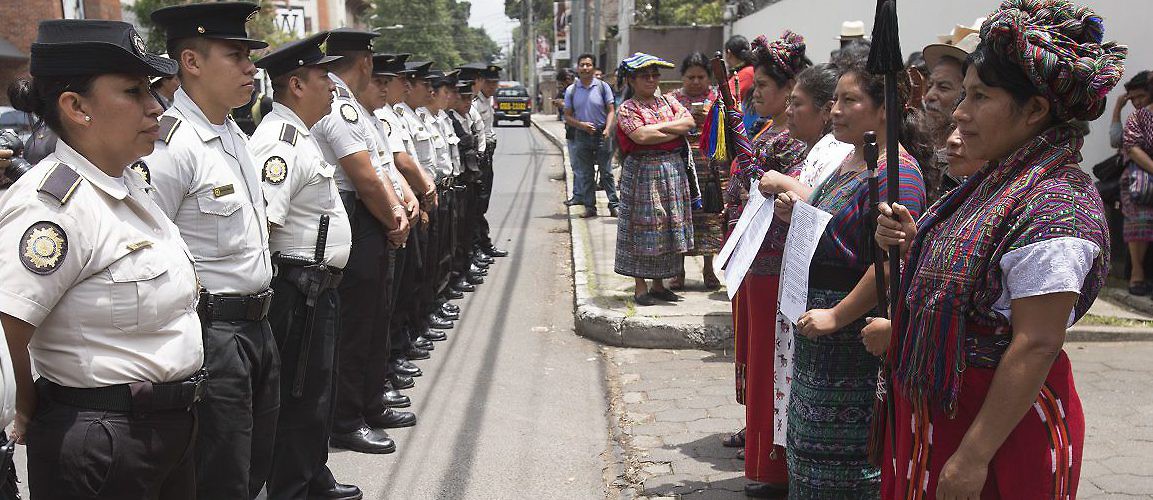Indigenous leaders face a police line as they offer support for International Commission Against Impunity commissioner Ivan Velasquez. Guatemala City, Guatemala, August 29, 2017 (Moises Castillo/Associated Press)
Guatemalan President Jimmy Morales last week declared the head of the International Commission against Impunity in Guatemala (CICIG), Iván Velásquez, “persona non grata” and threatened to expel him from the country. The comments followed allegations that the president’s party received illegal funding during his successful 2015 campaign. While Guatemala’s Constitutional Court repealed the president’s order and Velásquez remains at the CICIG helm, the affair highlights the great challenges Guatemala faces in protecting recent advances against corruption and impunity.
The CICIG is an independent international body established in 2006 with the assistance of the United Nations. It has a mandate to work with Guatemalan police and Attorney General Thelma Aldana to dismantle criminal networks that have long been entrenched in the country’s state institutions.
Prior to the 2015 election that brought Morales to power, Aldana and the CICIG presented evidence of a vast corruption network that stretched to highest levels of government, including cases of money laundering, illegal financing of political parties, and other illicit activities. This triggered widespread street protests and the removal and eventual jailing of the sitting president and vice president, along with many members of their cabinet.
More recently, the two investigating bodies have uncovered evidence that Morales’ National Convergence Front and the two other main parties which contested the 2015 poll received illegal campaign funding. This was despite Morales—a comedian and political neophyte at the time—running on a slogan of “Not corrupt, nor a thief” and as an opponent of the established order.
Investigating this type of illegal funding of political parties has been one of the CICIG’s main areas of focus and is considered to be at the heart of Guatemala’s corruption; Velásquez and Aldana have claimed that the issue is the “entry point of the negative cycle of corruption that works against the common good and in favor of sectoral interest.”
Although the general Guatemalan population supports the tides of change against the previous culture of impunity and corruption—and many have again taken to the streets in defense of the Velásquez and in opposition to Morales—there are powerful forces, including in the private sector, the military, and in the country’s Congress, working against these efforts and which continue to support the president remaining in his role and retaining immunity against the charges he faces.
Entrenched corruption was one of the major reasons that Guatemala did not achieve any of the UN’s Millennium Development Goals, which were in place from 2000-2015. Instead, levels of poverty in the country actually increased during much of this period. In place of sustainable development efforts, state funding has routinely been directed toward vested interests inside state institutions, starting from the post-civil war period in 1996 until the present.
The joint work of Aldana and Velásquez has been critical to revealing how deeply the corruption and culture of impunity runs and in obtaining prosecutions of those implicated in crimes. Indeed, Guatemalan jails are now at maximum capacity as a result of the number of prominent lawyers, businessmen, and other authorities who have been found guilty of corruption and “cooption of the state.” This is a particularly remarkable achievement considering the fact that the investigators have also brought to light how the Guatemalan judicial system has been compromised by an irregular selection process of judges in high-level courts.
Importantly, the Guatemalan justice process appears to have the full backing of the UN and members of the international community. While the case against him was being presented, Morales flew to New York for a meeting with Secretary-General António Guterres and asked that CICIG change its mandate and focus instead on persecuting drug traffickers rather than criminal networks in state institutions. Guterres voiced strong support for Velásquez and his work against corruption and impunity.
Guatemala’s Supreme Court has also maintained its independence and recently ruled that Congress should review the fate of the president’s immunity against the charges he faces. This stands in stark contrast to the situation in Venezuela, where the Supreme Court has become a tool for enforcing President Nicolás Maduro’s anti-democratic agenda.
I met with Attorney General Aldana in New York in June this year, shortly after the CICIG mandate had been renewed for another two years. She told me that Guatemala was now at a point where it “can move forward by strengthening its public institutions or it can step backwards and fall again in the hands of illegal networks that had been running the country.”
Guatemala thus lies at a critical juncture. The experience of the past two years has demonstrated that its institutions are able to uphold the rule of law. The continuing independence of the Supreme Court and support of the international community will be vital to maintaining a commitment to a culture of transparency, which will in turn help the country maintain its path to inclusive economic growth and sustainable development. Congress ending Morales’ impunity would now send the strongest signal that Guatemala remains on track to fully emerge from its troubled past.





